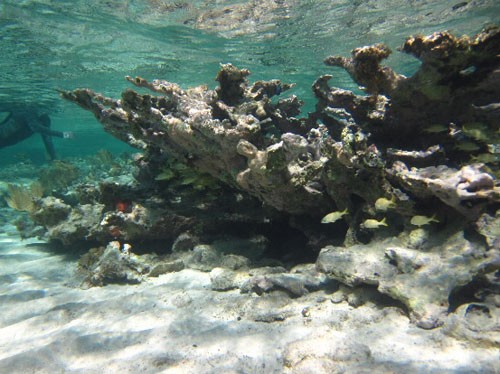Evidence reveals Caribbean corals cease growth or face erosion threat
by Caroline Kaurila on 27 Feb 2013

Caribbean coral reef James Cook University
http://cms.jcu.edu.au/
Many Caribbean coral reefs have either ceased growth or are on the brink of starting to erode, which new evidence has revealed. Associate Professor Scott Smithers, from James Cook University was a part of a seven-member team of international scientists that carried out work at reefs across the Caribbean over a two-year period.
Coral reefs build their structures by both producing and accumulating calcium carbonate, which is essential for the maintenance and continued growth of coral reefs.
The research team discovered that the amount of new carbonate being added by Caribbean coral reefs is now significantly below rates measured over recent geological timescales, and in some habitats is as much as 70 per cent lower.
Associate Professor Smithers said coral reefs formed some of the planet’s most biologically diverse ecosystems, and provided valuable contributions to humans and wildlife.
However, their ability to maintain their structures and continue to grow depended on the balance between the addition of new carbonate, which is mostly produced by corals themselves, set against the loss of carbonate through various erosional processes, he said.
Associate Professor Smithers said traditionally there had been a focus on how coral reef organisms coped under present environmental conditions, but little on how coral reefs as physical structures were faring.
'We decided to give it a go by quantifying the amount of skeleton laid down by reef organisms each year to build the reef framework and comparing that to the amount of physical and biological erosion,' he said.
'We found that many reefs in the Caribbean are now in a precarious balance with very slow growth rates or erosion common.'
Associate Professor Smithers said he was invited to collaborate on the project in his role as a geomorphologist.
'I look at how reef structures grow, and the landforms and features formed by reef growth processes,' he said.
'I was working with an international team made up of scientists with particular skills required to work out the reef growth - and destruction - budgets.'
Associate Professor Smithers said 'budgets' was a term geomorphologists used when talking about sediment or calcium carbonate.
The sediment that is produced or deposited is compared to what is eroded or withdrawn, and there is a net amount. If it is positive, growth is occurring, if it is negative, the structure is breaking down.
The field sites were in located in the Bahamas, Bonaire, Belize and Grand Cayman Island.
'I was able to participate in the field work at the first three sites, but was teaching at the time of the Grand Cayman visit.
'All members of the team were involved in refining the methodology for calculating the budget, and then making the budget calculations based on field data.'
The study could have implications for the Great Barrier Reef and other reefs around the world, despite the fact that different reefs behaved in different ways, he said.
'We hope to perform the same calculations for a variety of sites within the Indo-Pacific in the next few years.
'The reason we focused on the Caribbean reefs first is because we wanted to get the methodology developed and refined - and that is easier to achieve on Caribbean reefs because they are taxonomically and structurally less complex than reefs in the Indo-Pacific.
'This relative simplicity made the measurements and calculations necessary to derive the budgets more easy than if we had begun by focussing on reefs outside the Caribbean.'
Associate Professor Smithers said while this project was his first opportunity to see a lot of reefs in the Caribbean, he was 'shocked' by what he saw.
'Although there were some areas where the reefs seemed OK, they were generally very poor in terms of coral cover and fish compared to most reefs on the GBR,' he said.
'There are clearly parts of the GBR that are not in great shape, and there is evidence from some reefs that changes have occurred over historical timescales, but I doubt that many have reached the point we established for the Caribbean reefs where they are no longer actively building - but we need to confirm this by applying the technique here.'
The research was recently published in Nature Communications, an online multidisciplinary journal dedicated to publishing high-quality research in all areas of the biological, physical and chemical sciences.
A Leverhulme Trust (UK) International Research Network Grant funded the research. The scheme specifically supports international collaboration.
James Cook Univ website
If you want to link to this article then please use this URL: www.sail-world.com/106965